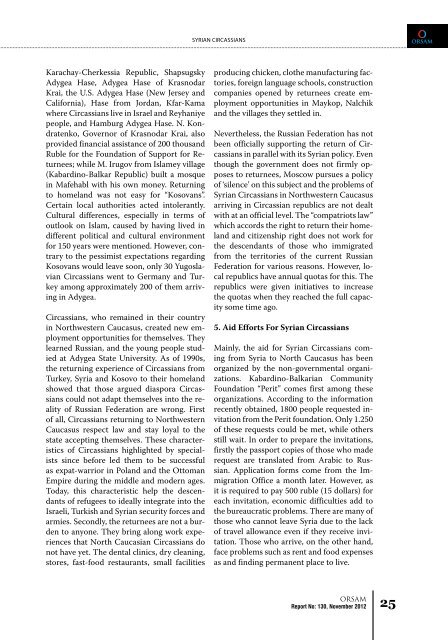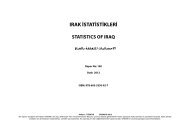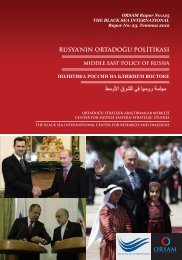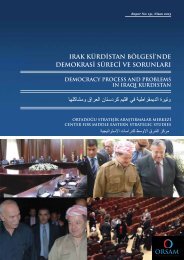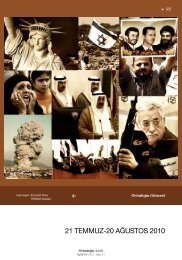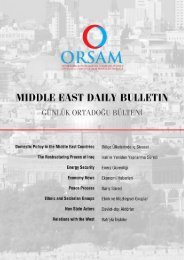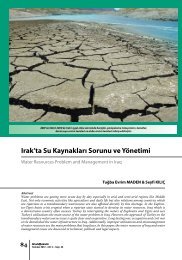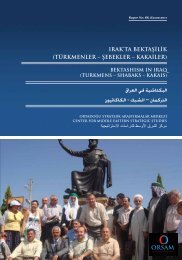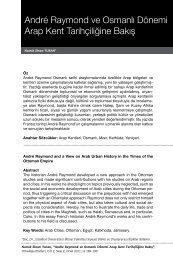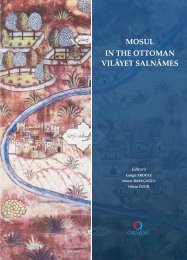SYRIAN CIRCASSIANS - orsam
SYRIAN CIRCASSIANS - orsam
SYRIAN CIRCASSIANS - orsam
Create successful ePaper yourself
Turn your PDF publications into a flip-book with our unique Google optimized e-Paper software.
<strong>SYRIAN</strong> <strong>CIRCASSIANS</strong><br />
ORSAM<br />
Karachay-Cherkessia Republic, Shapsugsky<br />
Adygea Hase, Adygea Hase of Krasnodar<br />
Krai, the U.S. Adygea Hase (New Jersey and<br />
California), Hase from Jordan, Kfar-Kama<br />
where Circassians live in Israel and Reyhaniye<br />
people, and Hamburg Adygea Hase. N. Kondratenko,<br />
Governor of Krasnodar Krai, also<br />
provided financial assistance of 200 thousand<br />
Ruble for the Foundation of Support for Returnees;<br />
while M. Irugov from Islamey village<br />
(Kabardino-Balkar Republic) built a mosque<br />
in Mafehabl with his own money. Returning<br />
to homeland was not easy for “Kosovans”.<br />
Certain local authorities acted intolerantly.<br />
Cultural differences, especially in terms of<br />
outlook on Islam, caused by having lived in<br />
different political and cultural environment<br />
for 150 years were mentioned. However, contrary<br />
to the pessimist expectations regarding<br />
Kosovans would leave soon, only 30 Yugoslavian<br />
Circassians went to Germany and Turkey<br />
among approximately 200 of them arriving<br />
in Adygea.<br />
Circassians, who remained in their country<br />
in Northwestern Caucasus, created new employment<br />
opportunities for themselves. They<br />
learned Russian, and the young people studied<br />
at Adygea State University. As of 1990s,<br />
the returning experience of Circassians from<br />
Turkey, Syria and Kosovo to their homeland<br />
showed that those argued diaspora Circassians<br />
could not adapt themselves into the reality<br />
of Russian Federation are wrong. First<br />
of all, Circassians returning to Northwestern<br />
Caucasus respect law and stay loyal to the<br />
state accepting themselves. These characteristics<br />
of Circassians highlighted by specialists<br />
since before led them to be successful<br />
as expat-warrior in Poland and the Ottoman<br />
Empire during the middle and modern ages.<br />
Today, this characteristic help the descendants<br />
of refugees to ideally integrate into the<br />
Israeli, Turkish and Syrian security forces and<br />
armies. Secondly, the returnees are not a burden<br />
to anyone. They bring along work experiences<br />
that North Caucasian Circassians do<br />
not have yet. The dental clinics, dry cleaning,<br />
stores, fast-food restaurants, small facilities<br />
producing chicken, clothe manufacturing factories,<br />
foreign language schools, construction<br />
companies opened by returnees create employment<br />
opportunities in Maykop, Nalchik<br />
and the villages they settled in.<br />
Nevertheless, the Russian Federation has not<br />
been officially supporting the return of Circassians<br />
in parallel with its Syrian policy. Even<br />
though the government does not firmly opposes<br />
to returnees, Moscow pursues a policy<br />
of ‘silence’ on this subject and the problems of<br />
Syrian Circassians in Northwestern Caucasus<br />
arriving in Circassian republics are not dealt<br />
with at an official level. The “compatriots law”<br />
which accords the right to return their homeland<br />
and citizenship right does not work for<br />
the descendants of those who immigrated<br />
from the territories of the current Russian<br />
Federation for various reasons. However, local<br />
republics have annual quotas for this. The<br />
republics were given initiatives to increase<br />
the quotas when they reached the full capacity<br />
some time ago.<br />
5. Aid Efforts For Syrian Circassians<br />
Mainly, the aid for Syrian Circassians coming<br />
from Syria to North Caucasus has been<br />
organized by the non-governmental organizations.<br />
Kabardino-Balkarian Community<br />
Foundation “Perit” comes first among these<br />
organizations. According to the information<br />
recently obtained, 1800 people requested invitation<br />
from the Perit foundation. Only 1.250<br />
of these requests could be met, while others<br />
still wait. In order to prepare the invitations,<br />
firstly the passport copies of those who made<br />
request are translated from Arabic to Russian.<br />
Application forms come from the Immigration<br />
Office a month later. However, as<br />
it is required to pay 500 ruble (15 dollars) for<br />
each invitation, economic difficulties add to<br />
the bureaucratic problems. There are many of<br />
those who cannot leave Syria due to the lack<br />
of travel allowance even if they receive invitation.<br />
Those who arrive, on the other hand,<br />
face problems such as rent and food expenses<br />
as and finding permanent place to live.<br />
ORSAM<br />
Report No: 130, November 2012 25


